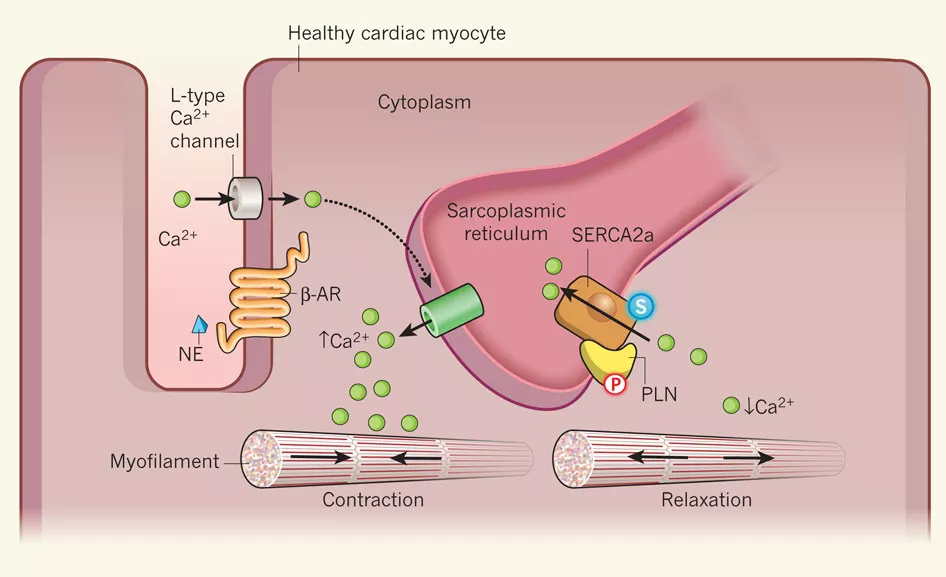Calcium in the heart, or cardiac calcification, is a condition in which calcium deposits form in the tissues of the heart. These deposits can occur in the heart muscle, valves, or arteries and can have significant implications for cardiovascular health.
This article delves into the causes, risk factors, and consequences of calcium buildup in the heart, providing insight into preventive measures and current research in the field.
Understanding Cardiac Calcification
Calcium is essential for many bodily functions, including the proper function of nerves and muscles, and it plays a crucial role in bone formation. However, when calcium accumulates in places where it shouldn’t, such as the heart, it can lead to serious health issues.
SEE ALSO: What Are The Symptoms of Blocked Heart Arteries
Types of Cardiac Calcification
Coronary Artery Calcification (CAC):
Occurs when calcium builds up in the arteries that supply blood to the heart muscle (coronary arteries). This is often detected by a cardiac CT scan and is a significant predictor of coronary artery disease.
Valvular Calcification:
Involves the deposition of calcium on the heart valves, typically the aortic or mitral valve. This can lead to stenosis (narrowing) of the valves, impeding blood flow and causing the heart to work harder.
Myocardial Calcification:
This is less common and can occur after a myocardial infarction (heart attack) when calcium deposits form in the scar tissue.
What Causes Calcium in the Heart?
The causes of calcium deposits in the heart are multifaceted, involving lifestyle factors, genetic predispositions, and underlying health conditions.
1. Age:
Aging is a significant risk factor. As the body ages, the valves and arteries can stiffen and calcify naturally.
2. Inflammation:
Chronic inflammation from conditions such as rheumatoid arthritis, lupus, or chronic kidney disease can lead to calcification. Inflammation in the arteries, often due to atherosclerosis (buildup of plaque in the arteries), can also trigger calcification as a response to injury.
3. High Blood Pressure:
Hypertension can damage blood vessel walls, promoting calcification as part of the repair process.
4. High Cholesterol:
Elevated levels of LDL (low-density lipoprotein) cholesterol can contribute to the formation of plaque, which may calcify over time.
5. Diabetes:
Diabetics are more prone to calcification due to the high levels of blood glucose which can damage arteries.
6. Genetic Factors:
Genetic predispositions can influence how calcium is processed in the body and how it accumulates in cardiac tissues.
7. Lifestyle Choices:
Smoking, sedentary lifestyle, and a diet high in fats and low in magnesium and vitamin K2 can all contribute to increased risk of cardiac calcification.
Detecting And Diagnosing Cardiac Calcification
Cardiac calcification is often detected incidentally through imaging tests such as X-rays, echocardiograms, or more commonly, through computed tomography (CT) scans. These tests can help visualize the extent of calcification and determine the specific areas affected.
Clinical Implications
Calcium deposits in the heart can lead to various complications depending on their location and severity:
Reduced Blood Flow: In the coronary arteries, this can lead to chest pain (angina), heart attack, or other ischemic heart conditions.
Impaired Valve Function: Calcification of heart valves can lead to heart failure or diminished cardiac output, necessitating surgical intervention in severe cases.
Arrhythmias: Calcium deposits can disrupt the normal electrical pathways of the heart, leading to irregular heartbeats.
SEE ALSO: What are the treatments for dilated coronary arteries?
Treatment And Management
Treatment for cardiac calcification focuses on managing the underlying conditions and mitigating risk factors:
Medications: Statins and blood pressure medications can be used to control cholesterol levels and hypertension.
Lifestyle Modifications: Adopting a heart-healthy diet, regular exercise, and smoking cessation are crucial.
Surgical Interventions: In severe cases, surgical interventions such as valve replacement or repair may be necessary.
Prevention
Preventing cardiac calcification involves a proactive approach to cardiovascular health:
Regular Check-ups: Regular screenings for cholesterol, blood pressure, and other related conditions can help catch risk factors early.
Diet and Exercise: A balanced diet rich in fruits, vegetables, and low in saturated fats, coupled with regular physical activity, can significantly reduce the risk.
Manage Chronic Conditions: Effectively managing conditions like diabetes and hypertension can minimize the likelihood of calcification.
Current Research and Future Directions
Ongoing research aims to better understand the mechanisms behind calcification and to find more effective treatments.
Recent studies have explored the genetic basis of calcification, as well as the potential of certain medications to prevent or reduce the progression of calcification.
Conclusion
Calcium in the heart, while common, poses significant health risks.
Understanding the causes and risk factors is essential for prevention and management. Regular medical check-ups, lifestyle changes, and management of underlying conditions are critical in managing cardiac calcification. As research advances, new insights and treatments are expected to improve the prognosis for individuals with this condition.

